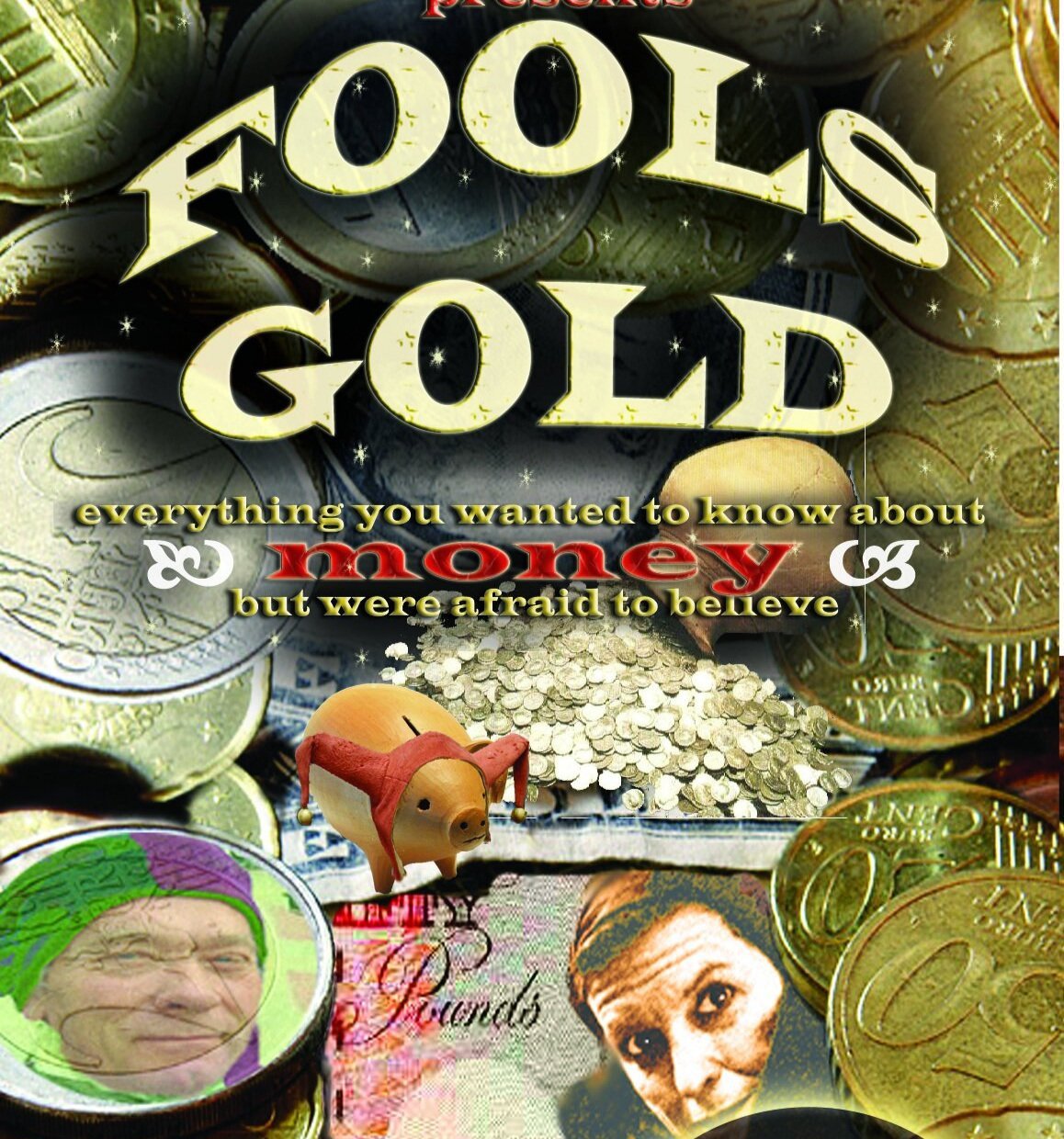
FOOLS GOLD
a comic show about money
“These fools play dramas about money, walking a tightrope between comedy and tragedy, irreverently opening bank accounts and exposing their stories”
Our work on money is intended to raise consciousness about how we use money, both in how money is created and how we emotionally relate to money.
The show Fools Gold was originally commissioned by Regio Gelt, for a conference on alternative currencies in Germany, where there are more than 30 regions successfully operating local currencies. The Germans understand the importance of local money structures to encourage local trade; this retains the buying power of the money in the region.
Money serves several purposes so it is important to understand what is required of it, for example, as a means to facilitate trade and commerce, as a store of value, i.e. savings or a mark of status and power. The opportunity to fulfil all these purposes is the challenge to any currency but local currencies can be created to fulfil one purpose, usually trade, most efficiently. The creation of local currencies gives us the chance to examine what we do with our money and how it feels. In Germany the show Fools Gold and The Money Game workshop has proven useful when launching and developing new currencies to give them a better chance of success, principally because it can change peoples relationship to money.
he benefits to a community of encouraging local trading links through local currency are many, however it is important to embrace an area that can fulfil all the needs of the populations purchases. Local may not purchase new cars but it could trade and repair with greater benefit to all, Cuba is a great example of this. Hand made craft and building may be too expensive in national money but accessible to others with skills to trade that might not find a broader market. Trust and relationship can be built through trade but it may mean examining our feelings about who we choose to trade with and why. Old family feuds can get in the way of trade.
The subject of money can seem dry and uninteresting but “fools gold” injects comedy and pathos into areas of our life that we rarely consciously expose. We fools believe that our feelings are the greatest key to changing our behaviour not only that, it makes good theatre. The Merchant of Venice meets Dragons Den!
“A fool and their money are soon parted, a wise fool gives their money away”
Potential Audience
Transition and parallel communities, Cornwall media and artists and Credit Union members, interested in a local currency for Cornwall.
People who want to gain some understanding about their relationship with money, why it works the way it does and how life experience can determine how we behave with money.
For those who want to know where money comes from, how it is created and distributed.
For people who are interested in understanding the considerable innate wealth of Cornwall, not the wealth that comes with the visitors and leaves the county within 48 hours.
As the show is improvised, it is tailored to the needs of the audience.
The Money Game Workshop
The game works best with a least 20 people.
Lasts a minimum of 3 hours, can be a day or even a weekend.
The Money Game is a simulation game developed more than 15 years ago to help people in all financial situations to understand the feelings and beliefs we have about money in our lives and in society.
Each person brings a certain amount of money that may lessen or grow depending on how the game goes, so bring an amount you don’t mind losing but that is enough to feel like you are taking a bit of a risk.
This is a chance to explore your own feelings about some aspects of money. The origins are in Findhorn’s Game of Life.
One of the key things we have seen in the way of people taking charge of their money is the amount of secrecy and unawareness there is around it.
There are so many norms and rules and beliefs about money that we all pick up, both from our families and from the wider culture—beliefs that are often unspoken and contradictory. And because money is not a polite topic of conversation, we rarely get to examine these.
This game is a fun way to break that silence. It is designed to jiggle a little bit some of the rigid ways we interact and open our minds to new possibilities that feel freeing to us.
We hope, out of the game, players will gain:
• Greater awareness about own values and habits
• Greater freedom of action and belief
• Personal and societal insight
Participants should bring:
Real money, preferably in small notes and large change: The amount is up to you; it has been played with from £1 to £200.
A journal and pen or pencil.
A willingness to explore